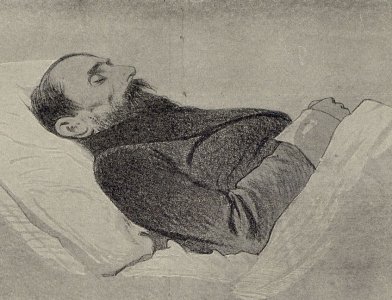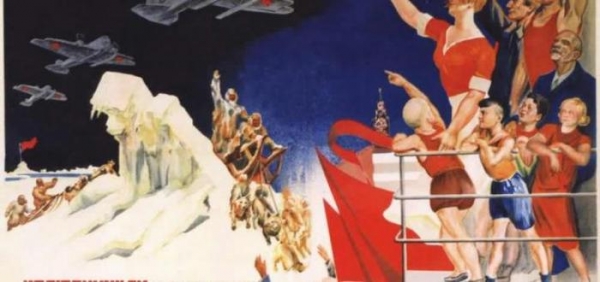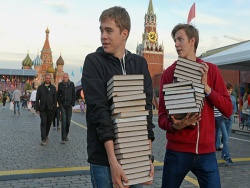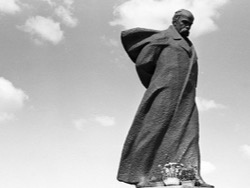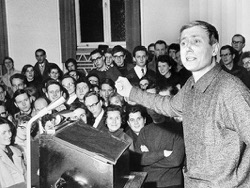
Maxim Amelin about rap seventeenth century, the poetry of Ivan the terrible and Russian “the Beatles”
The poet not only in Russia and not only in the 1960s was more than a poet. Even in ancient times there were poets stars poets and dissidents. Poets, suffer from a lack of Metropolitan residence, and poets, and earning money by crowdfunding. 21 March — world poetry day. That poems were written Ivan the terrible and what was the cash equivalent of the literary prize when Gabriel Derzhavin, a poet and publisher Maxim Amelin talked Explorer “Ribbon.ru” Natalia Kochetkova.
In addition, that a poet is someone who writes poems, he has many roles. It can be a court poet or a dissident, to behave as an ordinary citizen or to be sufficiently exalted. If you try to trace the social function of the poet and his way of behavior in society from antiquity — who was the poet?
The ancient Greek poet, to some extent, had the status of a national hero. Despite the fact that the nation as such there was — were rather separate city-States. Every town was proud of his poetical representative. Say, Pindar wrote choral lyrics, was from the clan of priests and deserve a lifetime statue.
Our money is a pop star?
Rather like Steven Spielberg. If we consider the text of Pindar as a scenario, he built the production of a spectacle — the action that was going on thousands of years of a huge crowd. True, his lyrics were difficult to understand, but it does not bother anyone. But the poets lyrical was more difficult. Sappho, Alkey have been exiled from the island of Lesbos in the time of arrival of the tyrant Pitaka. That is, their social status was quite high. And they wrote, by the way, political lyrics — its already in the twentieth century found.
Dissidents and political emigrants?
To a certain extent. 15 years they were in exile, and after the change of power came back. In Rome the poet’s life was more difficult. Here an example is Catullus, who wrote, in modern parlance, naughty lyrics, attacking the Imperial power of Caesar, and social status was quite low, although he was descended from a noble family of Verona, but in Rome it was nothing. In fact, Catullus was the Roman residence, which he never received — did not live up to the moment when the provincial elites were given the opportunity to obtain full citizenship. That is, while in Rome, he was restricted in his rights.

Maxim Amelin
Photo: Vitaly Belousov / RIA Novosti
And then the poets, from those who are considered the classical Canon — Vergil, Horace — they were already recognized by public poets. They supported each August Patron, they were paid some crazy fees. What is their publishing destiny — we don’t know. Ovid was an exile, but it is still unclear what is the dark history.
Commercial poetry is rather the time of Martial. His ironic verses earned. Paying audience. His books were very popular.
If we move in the direction of the middle Ages — troubadours, minnesingers — we can say that poetry drifted toward estratest?
Rather, it was a court function. Initially it was the knights who composed poetry. They were military, and the verses about the Beautiful Lady wrote for the soul. It was a very intricate texts — for example, the first line could rhyme with the eighteenth in any of Walther von der Vogelweide. Such complex formal problem can be compared only with the construction of a Gothic Cathedral, where there are parts that people cannot see because they are addressed only to the sky. At the hearing, it was not perceived — it was possible only to read. There’s a handwritten existence of these texts was used.
Then this status has dropped slightly, because this way of writing has gripped many. The phenomenon of Trubadura or minnesingers were rampant — there were a huge number of different backgrounds.
Do I understand correctly that the figure of the poet in Russia we can talk about seventeenth century — somewhere with Simeon of Polotsk, Sylvester Medvedev?
Before there was the so-called folk poetry, and she also had a variety of functions. From all coming to us foreigners it is known that at the court of Ivan the terrible were their singers, performers of texts, which at the time was not called nor epics, nor antiquity. Function these performers were close to those who had been called aadami in antiquity. To have survived this huge body of folklore, need the consumer: first, they sang for kings, and then to someone else.
But still the folklore figure of the author ignores.
However, the author’s poetry book, there was a separate spiritual tradition, only the lyrics almost didn’t sign up. Here is preserved the texts of the XVI century, signed by Parthenius Urodynam — these were the poems of Ivan the terrible. It is religious poems, written according to the canons, but they have their own features. For example, a lot of brutal detail that is not typical even for antiquity.
And at the beginning of the seventeenth century author poetry appears in abundance. This and poetical insertions in prose — for example, Abraham Palitsyna in the famous “Legend”. Was “mandatory school” Stihotvorenija: Simeon Shakhovskoi wrote a long text verses, however, is quite specific. That is not syllabic poetry, and virteva. Raesly this verse is like a modern rap.
Their social status with what?
They are either monks or Church leaders, or, as Shakhovskoi, is formed by the boyars, read the books, because they have references to European literature.
It should be understood that our poets of the seventeenth century wrote on the recension of the Church Slavonic language East Slavic type. Poetry was the lot of competent people who know this is close to the Russian, but nevertheless a different language. And it lasted until the end of Peter’s time. The first poet who began to write in Russian, was a Moldavia Antioh Cantemir. Not on the Ukrainian recension of Church Slavonic language in which he wrote Stefan Yavorsky, Feofan Prokopovich, or — in their Ukrainian poetry rhyme. Yavorsky and Prokopovich were Church hierarchs, and Cantemir was the son of the Moldavian hospodar, although retired. Poetry used to be a privilege of high society.
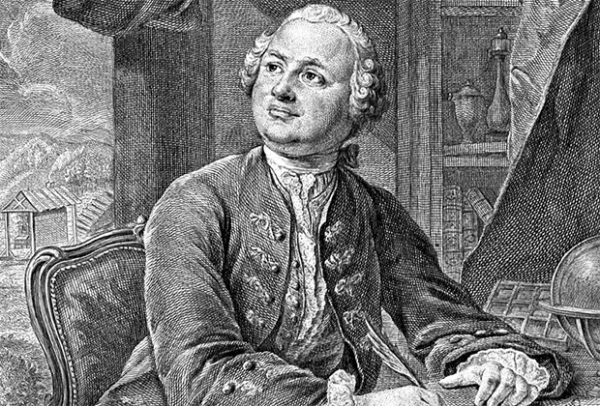
Mikhail Lomonosov
Image: Ivtorov / Wikipedia
The middle of the eighteenth century is the Trediakovsky and Lomonosov. Also impossible to say that came very much from the bottom. They were educated circle. Trediakovsky received a French education at the Sorbonne, Lomonosov and German in Marburg. Their social status was quite high. Lomonosov above, because he primarily was a scholar and organizer of the famous fireworks — in fact the court fireworks
And a court poet. Then was still way on his knees to bring an ode to the Empress?
It Trediakovsky when Anna Ivanovna lap tray — it has revived the tradition of the XVII century. Lomonosov and in the reign of Elizabeth. There was also a gradual displacement of ancient traditions in favor of European — European understanding of the poet and his status.
Here Derzhavin, for example, received a government post due to the fact that he was a poet and wrote an ode “Felitsa”. Not laudatory, note, but rather ironic. Apparently, the Empress tired of the endless hype. Although it was Canon. Each event was accompanied by a sort of choir ticheskih works.
Now how about Patriotic songs on public holidays?
Yes. The situation with Lomonosov similar to the situation with Pindar, as discussed above. The poetry reading was part of the action. Fireworks, decoration of everything, trips… This was included in the annual rite. For that poets have received certain remuneration, it was in money, and sometimes gifts.
What kind they were gifts?
Snuffbox, decorated with diamonds. Rings. Somebody got very specific insignia. For example, the lyre of diamonds. For “Felice” Derzhavin received a large sum of money — so much that they could buy the estate. That is, it was something like the state award.
At what point in the path of poetry and of the civil service differ? Here comes Radishchev, for example.
Radishchev was hurt accidentally. For the same book, he could get a gold snuffbox. Story strange. How much over it is neither one nor the other — to explain it and failed: why he went to Ilimskiy stockaded town. Then it was a turbulent time — the French revolution. The book Radishchev and the French execution of the Imperial family happened in one year. It’s just not time released his book, released earlier things would have been different.
And the question of professionalization of poetry occurs in Pushkin times. Pushkin was the first to set himself the task of becoming a professional poet.
That is to live on the fees?
Yes, but couldn’t spend a lot. But before that even happened the monetization of poetic status. This was expressed in the state Board. It got the wings — something about 4 000 rubles a year. Even Gnedich. It was quite decent money. Who had the estates of the rich — they lived on the income from estates. But Pushkin was the first who decided to move away from this to some degree perverse. And then, already under Nicholas I, the system is coagulated, and become poets themselves.
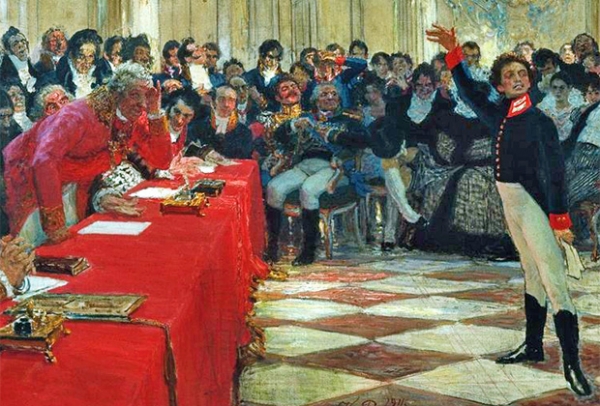
Ilya Repin painting “Pushkin on the Lyceum examination, in Tsarskoe Selo”
By the way, in Pushkin’s time there were poets and peasants. There was a poet Slepushkin, the poet Koltsov — from better known. Actually quite a lot of them it was, even printed in the magazines.
How loud was the voice of the poet? So, as accepted to talk in the Soviet school, or he was heard rather narrow circle of their own kind?
Narrow circle, only the elite. Edition of Pushkin’s journal “Sovremennik” was 1200 copies. So when they say that all Russia was read… This reading was 1200. And “Eugene Onegin” was published with circulation of 3,000 copies. It is an indicator. It’s not even that the majority of the population was illiterate, it isn’t. Not heard of the book — Russia is huge. I just recently thought, on 19 March 1814 Russian troops entered Paris. And to St. Petersburg this news came on April 14. That is, it was four weeks — all this time nobody knew Paris taken or not taken. And to Kamchatka many was?
The poet Vyazemsky was forced to serve all life — he was a civil servant. Acting Minister of Finance, he had a serious position.
The feta was a difficult situation. He was either FET, whether Shenshin, as we all remember. And was forced to serve in the army, to curry favor themselves nobility. Didn’t serve. Quit, because all the time raised the qualification. And the Emperor Alexander II to him the nobility were awarded for translations of Horace.
In the twentieth century the figure of the poet varies: there are prone to the outrageous, the rebellious, on the one hand, — like the futurists with their yellow jackets and patterns on the cheeks. On the other those who meticulously builds his literary reputation, Esenin, struggling pretending to be a peasant.
If the symbolists considered themselves priests and celestials, their followers and almost all currents of the early twentieth century came out of the symbolism is terribly fond of the so-called building of life. This is generally the property of the Silver age, this much Khodasevich wrote. For example, we nothing particularly remarkable to say about who was on FET life. First the military, then the landowner who raised pineapples in the province of Kursk, Yes. But the figure itself still remains unclear. That is, himself — the poet as a separate unit it didn’t stick out. And the Silver age brought the poet such as we imagine. Now, however, this type is probably passed in grade operetta: in a strange outfit, with her hair down, ecstatic. And then it was quite naturally, each poet tried to find some sort of image, character. Avoid it only Khodasevich. Mandelstam, for example, played in Pushkin — a cane and top hat.
And Andrew White caught a unicorn at the walls, think of the Novodevichy convent…
Yes, and so on. But I must say that all this poetic growth linked to economic growth in Russia at that time. The old believer capitalism, which was the basis for this incredible industrial surge. Many representatives of the old believers of capitalism supported music, poetry, ballet Morozov, Ryabushinsky and so on. And in magazines was paying very high fees. They could live for several months, and then six months. Printed selection of poems in “the Golden fleece” — and live six months. A plus were the performances, they were paid. The entrance to the “Stray dog” was worth 25 roubles — the salary of the worker. Although the public was still not very much. Even the most widely circulated poet Igor Severyanin more than 10 000 copies never came out, but he was really a pop star of that time.
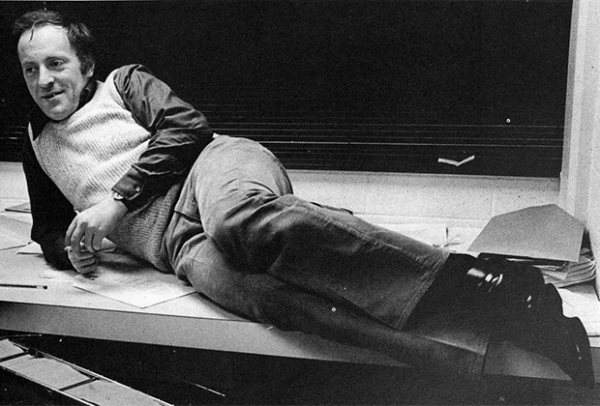
Joseph Brodsky
Photo: University of Michigan
In Soviet times there was an attempt to put ideological framework, on the one hand, and with another — to give approximately the same fees as before the revolution. Just as the Soviet chervonets first tried to equate the pre-revolutionary Ducat. But it did not help: the best poets left in the transfer in any related field.
Were there any poets in Russia as popular as in the 1960s, when they played stadiums?
Only in 60-ies. Neither before nor after. It was a certain social phenomenon. Because poets of the time talked about, what was in the papers, but a little more vivid language. And this liveliness and freedom from stereotypes and cliches lifted them to stardom. During these years in England, the Beatles gathered comparable audience. And then it all went down. But interest in poetry disappear altogether can’t — can only be reduced to the same level in 1200 copies.
Why now poetry — the phenomenon of the chamber, if not to say marginal?
Good poetry is always a language ahead of its time. There is an inevitable gap. Not everyone may perceive it. Perceived previous poetics. They are read with more interest than the poetry of his contemporaries. We have now the poetry of the early twentieth century and to some extent poetry of Brodsky.
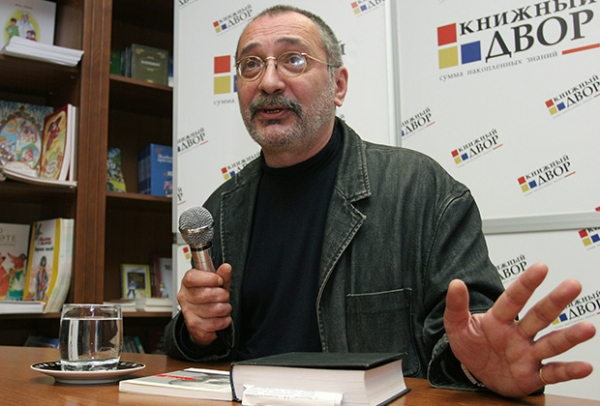
Timur Kibirov
Photo: Maxim Bogodvid / RIA Novosti
If to speak about modern poetry, it is not different directions — they all ended in the twentieth century. No matter how they tried to create — they do not survive. And the figure of the poet became rather a lonely figure standing. And because of his restlessness and inability to sit in a cell of acmeists or imaginist poet difficult to understand. In this sense, the task for contemporaries complicated.
Not so long ago we published a textbook entitled “Poetry”, which is designed poetics of these recently to bring to the reader, to involve him in this exciting game.
Maxim, here you are — publisher, literary Manager, but also a poet and writer. Poet you now how feel?
For me poetry is what I live, how pompous it may sound. But I can only write on vacation. Because, like everyone else, I am forced to work.
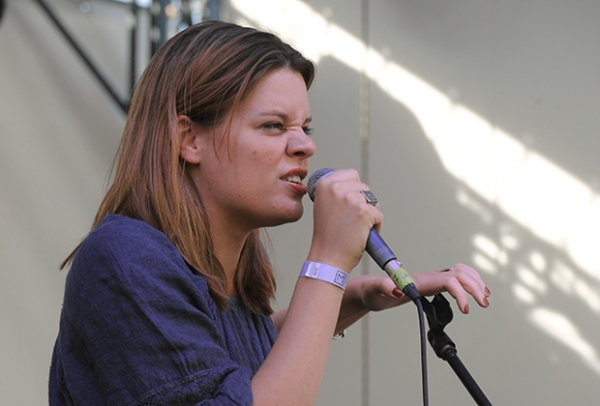
Vera Polozkova
Photo: Vasily Shaposhnikov / Kommersant
But the holiday is not very many times a year.
Here! Therefore, it is necessary to prepare. Accumulate certain ideas for the holidays to perform an emergency method, without departing from notebooks and the computer. Nothing else, unfortunately. All modern poets basically work for someone else. The social status of the poet today is quite low. However, now it will be an evening of Faith Polozkova CDL and supposedly the tickets cost from 2500 to 3500 rubles. Don’t know — maybe so. Why not? Perhaps this is a specific property of time: it took to have such variety in poetry.

